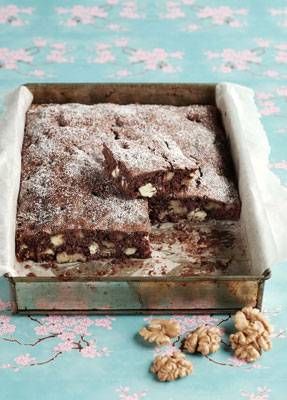White Chocolate and Walnut Brownie

White chocolate and walnut brownie
Ingredients
150g reduced salt canola margarine, melted
1/3 cup cocoa powder, sifted
1½ cups self raising flour, sifted
¾ cup caster sugar
3 eggs, lightly whisked
2 tablespoons skim milk
100g raw walnuts, roughly chopped
150g white chocolate, roughly chopped
1 tablespoon icing sugar or cocoa, to serve
Method
Preheat oven to 160C. Place the melted margarine, cocoa, flour, sugar, eggs, milk, walnuts and white chocolate in a large bowl and mix until fully combined. Spoon the mixture into a 20cm x 30cm tin lined with non stick baking paper.
Bake for 30 minutes or until set on top. Brownie should be quite moist in the middle. Serve warm or at room temperature, dusted with a little icing sugar or cocoa.
Serves 8.
Nutrient content per serve
Energy 2130kJ (510kcal), Protein 9g, Total fat 31g, Saturated fat 8g (26% of total fat), Monounsaturated fat 12g, Polyunsaturated fat 9g, Carbohydrates 51g, Fibre 2g
Nuts for Life
According to Nuts for Life Consumer Research on Australian adults in 2008, many people are confused about dietary fats - what's healthy and what's unhealthy. While nearly three quarters of those surveyed (74%) correctly understand that saturated fat is the unhealthy or -bad' fat, most people are confused about the difference between the unsaturated fats – the monounsaturated and polyunsaturated fats.
So, what is the difference?
Each type of fat is never found solely on its own in food sources. All three are usually present but in different proportions.
Saturated fat Mainly found in foods from animal origin e.g. meats and dairy. An exception includes products made from plant based coconut and palm oil. The liver in our body can make blood cholesterol from the saturated fat we eat in our diet. High blood cholesterol is linked with an increased risk of heart disease.
Polyunsaturated (Poly) fat Derived mainly from plants e.g. nuts, seeds (which can be processed into cooking oils and margarine), plus fish and seafood. Polys can be further classified as omega-3 and omega-6 fatty acids. Polys are needed for cholesterol lowering and heart health . Marine omega-3 fats are also needed for healthy brain function and for maintaining healthy joints.
Nuts high in polyunsaturated fat: Walnuts, Hazelnuts, Pine nuts and Brazil nuts.
Monounsaturated (Mono) fat Also mainly derived from plant-based foods e.g. nuts, avocados, olives, olive, canola and nut oils, and eggs. Monos regulate blood cholesterol levels but not to the extent that polyunsaturated fats can. They can however raise HDL cholesterol – the 'good" kind that helps clear arteries.
Nuts high in monounsaturated fat: Macadamias, Cashews, Almonds, Pistachios and Pecans.
Are nuts a source of healthy or unhealthy fat?
While tree nuts contain between 49 – 76 percent fat, with the exception of chestnuts which contain 0.5 percent, this does not mean they are unhealthy.
Nutrition research has shown that eating just a handful of nuts (30g) most days can reduce the risk of heart disease, improve blood circulation and lower the body's blood cholesterol . In addition they help control hunger cravings. These delicious, crunchy foods are a great way to get healthy and stick to those New Year resolutions! Get the Power of Un!
For more information on the health benefits of nuts and nut recipes for all occasions please visit www.nutsforlife.com
MORE





